2014届高三英语(第1轮)阶段检测卷(三)(译林牛津版 江苏)
- 格式:doc
- 大小:166.00 KB
- 文档页数:11
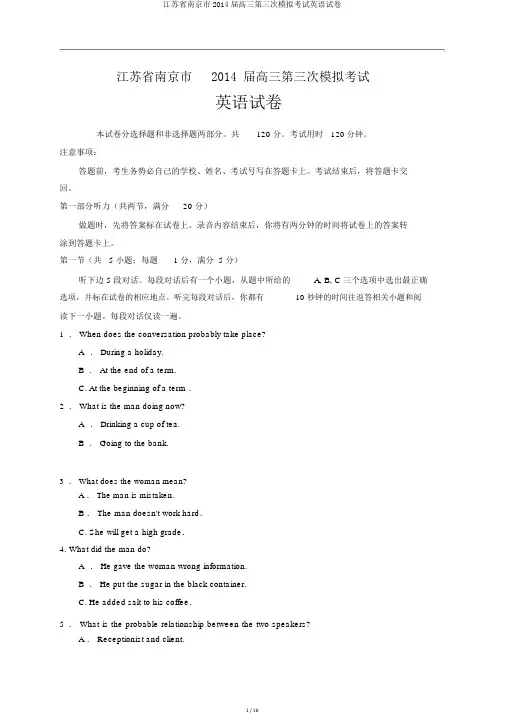
江苏省南京市2014 届高三第三次模拟考试英语试卷本试卷分选择题和非选择题两部分。
共120 分。
考试用时120 分钟。
注意事项:答题前,考生务势必自己的学校、姓名、考试号写在答题卡上。
考试结束后,将答题卡交回。
第一部分听力(共两节,满分20 分)做题时,先将答案标在试卷上。
录音内容结束后,你将有两分钟的时间将试卷上的答案转涂到答题卡上。
第一节(共 5 小题;每题 1 分,满分 5 分)听下边 5 段对话。
每段对话后有一个小题,从题中所给的A, B, C 三个选项中选出最正确选项,并标在试卷的相应地点。
听完每段对话后,你都有10 秒钟的时间往返答相关小题和阅读下一小题。
每段对话仅读一遍。
1. When does the conversation probably take place?A. During a holiday.B. At the end of a term.C.At the beginning of a term .2. What is the man doing now?A. Drinking a cup of tea.B. Going to the bank.3. What does the woman mean?A . The man is mistaken.B . The man doesn't work hard.C. She will get a high grade.4. What did the man do?A. He gave the woman wrong information.B. He put the sugar in the black container.C.He added salt to his coffee.5. What is the probable relationship between the two speakers?A . Receptionist and client.B . Boss and secretary.C. Professor and student.第二节(共15 小题;每题 1 分,满分15 分)听下边 5 段对话或独白。
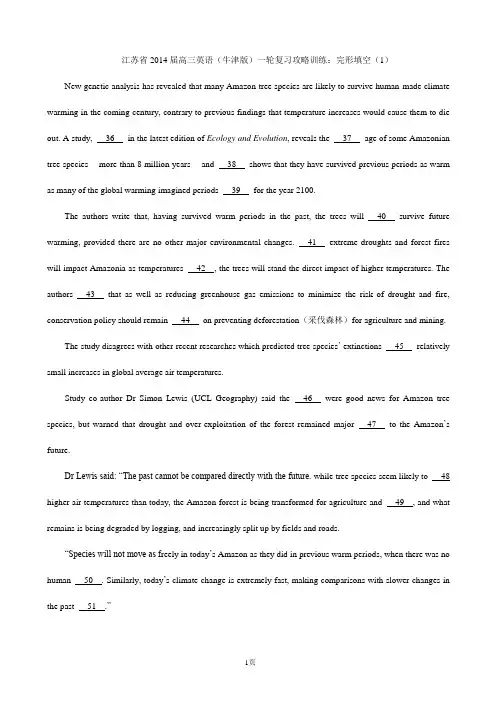
江苏省2014届高三英语(牛津版)一轮复习攻略训练:完形填空(1)New genetic analysis has revealed that many Amazon tree species are likely to survive human-made climate warming in the coming century, contrary to previous findings that temperature increases would cause them to die out. A study, 36 in the latest edition of Ecology and Evolution, reveals the 37 age of some Amazonian tree species -- more than 8 million years -- and 38 shows that they have survived previous periods as warm as many of the global warming imagined periods 39 for the year 2100.The authors write that, having survived warm periods in the past, the trees will 40 survive future warming, provided there are no other major environmental changes. 41 extreme droughts and forest fires will impact Amazonia as temperatures 42 , the trees will stand the direct impact of higher temperatures. The authors 43 that as well as reducing greenhouse gas emissions to minimize the risk of drought and fire, conservation policy should remain 44 on preventing deforestation(采伐森林)for agriculture and mining.The study disagrees with other recent researches which predicted tree species’ extinctions 45 relatively small increases in global average air temperatures.Study co-author Dr Simon Lewis (UCL Geography) said the 46 were good news for Amazon tree species, but warned that drought and over-exploitation of the forest remained major 47 to the Amazon’s future.Dr Lewis said: “The past cannot be compared directly with the future. while tree species seem likely to 48 higher air temperatures than today, the Amazon forest is being transformed for agriculture and 49 , and what remains is being degraded by logging, and increasingly split up by fields and roads.“Species will not move as f reely in today’s Amazon as they did in previous warm periods, when there was no human 50 . Similarly, today’s climate change is extremely fast, making comparisons with slower changes in the past 51 .”“With a clearer 52 of the relative risks to the Amazon forest, we 53 that direct human impacts -- such as forest clearances for agriculture or mining -- should remain a key point of conservation policy. We also need more aggressive 54 to reduce greenhouse gas emissions in order to make minimum the risk of drought and fire impacts and 55 the future of most Amazon tree species.”36. A. advertised B. described C. published D. presented37. A. frightening B. surprising C. exciting D. interesting38. A. still B. nevertheless C. however D. therefore39. A. assess B. confirm C. forecast D. promise40. A. particularly B. probably C. merely D. possibly41. A. Since B. Although C. When D. If42. A. rise B. change C. drop D. end43. A. consider B. decide C. guarantee D. recommend44. A. based B. built C. focused D. made45. A. in relation to B. in response to C. in reply to D. in reference to46. A. findings B. thoughts C. inventions D. writings47. A. threats B. disadvantages C. embarrassments D. instructions48. A. accept B. tolerate C. permit D. require49. A. farming B. planting C. catering D. mining50. A. power B. influence C. desire D. violence51. A. difficult B. clear C. easy D. important52. A. belief B. direction C. understanding D. suggestion53. A. doubt B. conclude C. calculate D. prefer54. A. thought B. guidance C. protection D. action55. A. secure B. advance C. sacrifice D. evaluate完形:36-40 CBDCB 41-45 BADCB 46-50 AABDB 51-55 ACBDAAWranglers and StranglersYears ago there was a group of brilliant young men at the University of Wisconsin,who seemed to have amazing creative __1__ talent. They were would-be poets,novelists,and essayists. They were extraordinary in their __2__ to put the English language to its best use. These promising young men __3__ regularly to read and critique (评论) each other's work. And critique it they did!These men were merciless with one another. They __4__ the minutest literary expression into a hundred pieces. They were heartless,tough,even mean in their __5__.The sessions became such areas of literary criticism that the __6__ of this special club called themselves the “Stranglers (扼杀者)”.In order to __7__,the women of literary talent in the university __8__ to start a club of their own,one comparable to the Stranglers. They __9__ themselves the “Wranglers (争论者)”.They,too,read their __10__ one another. But there was one great difference. The criticism was much softer,more __11__,more encouraging. Sometimes,there was almost no criticism at all. Every effort,even the weakest one,was __12__.Twenty years later an alumnus of the university was making an exhaustive __13__ of his classmates' careers when he __14__ a vast difference in the literary accomplishments of the Stranglers as opposed to the Wranglers. Of all the __15__ young men in the Stranglers,no one had made a significant literary __16__ of any kind. From the Wranglers had come six or more successful __17__,some of national renown such as Marjorie Kinnan Rawlings,who wrote The Yearling.Talent between the two?Probably the same. Level of __18__?Not much difference. But the Stranglers were strangled,while the Wranglers were determined to give each other a(an) __19__.The Stranglers __20__ an atmosphere of argument and self-doubt. The Wranglers highlighted the best,not the worst.1. A. architectural B. artistic C. literary D. musical2. A. strength B. ability C. performance D. power3. A. gathered B. organized C. challenged D. collected4. A. turned B. translated C. combined D. divided5. A. appreciation B. criticism C. assessment D. judgment6. A. leaders B. organizers C members D. arrangers7. A. participate B. practice C. succeed D. compete8. A. determined B. agreed C. promised D. dreamed9. A. regarded B. called C. thought D. recognized。
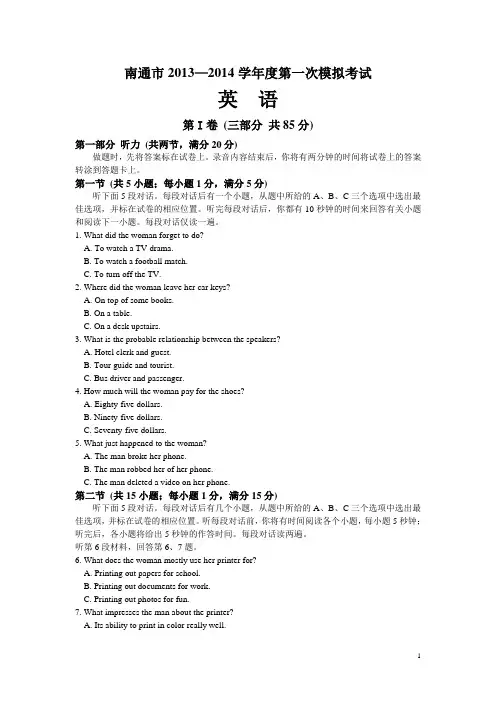
南通市2013—2014学年度第一次模拟考试英语第I卷(三部分共85分)第一部分听力(共两节,满分20分)做题时,先将答案标在试卷上。
录音内容结束后,你将有两分钟的时间将试卷上的答案转涂到答题卡上。
第一节(共5小题;每小题1分,满分5分)听下面5段对话。
每段对话后有一个小题,从题中所给的A、B、C三个选项中选出最佳选项,并标在试卷的相应位置。
听完每段对话后,你都有10秒钟的时间来回答有关小题和阅读下一小题。
每段对话仅读一遍。
1. What did the woman forget to do?A. To watch a TV drama.B. To watch a football match.C. To turn off the TV.2. Where did the woman leave her car keys?A. On top of some books.B. On a table.C. On a desk upstairs.3. What is the probable relationship between the speakers?A. Hotel clerk and guest.B. Tour guide and tourist.C. Bus driver and passenger.4. How much will the woman pay for the shoes?A. Eighty-five dollars.B. Ninety-five dollars.C. Seventy-five dollars.5. What just happened to the woman?A. The man broke her phone.B. The man robbed her of her phone.C. The man deleted a video on her phone.第二节(共15小题;每小题1分,满分15分)听下面5段对话。
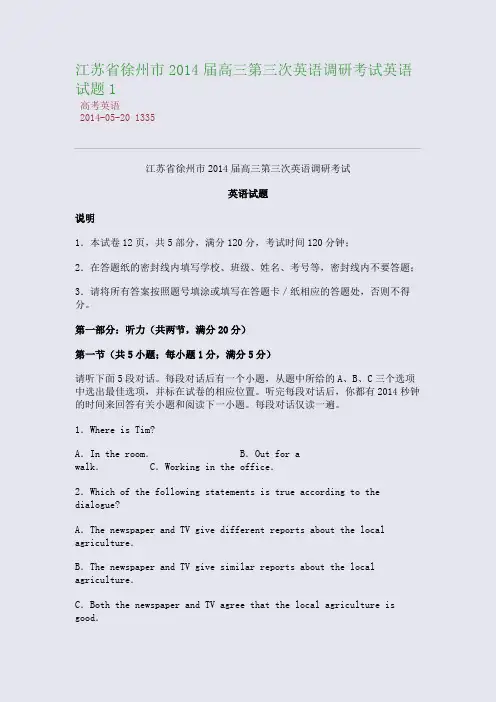
江苏省徐州市2014届高三第三次英语调研考试英语试题1高考英语2014-05-20 1335江苏省徐州市2014届高三第三次英语调研考试英语试题说明1.本试卷12页,共5部分,满分120分,考试时间120分钟;2.在答题纸的密封线内填写学校、班级、姓名、考号等,密封线内不要答题;3.请将所有答案按照题号填涂或填写在答题卡/纸相应的答题处,否则不得分。
第一部分:听力(共两节,满分20分)第一节(共5小题;每小题1分,满分5分)请听下面5段对话。
每段对话后有一个小题,从题中所给的A、B、C三个选项中选出最佳选项,并标在试卷的相应位置。
听完每段对话后,你都有2014秒钟的时间来回答有关小题和阅读下一小题。
每段对话仅读一遍。
1.Where is Tim?A.In the room. B.Out for a walk. C.Working in the office.2.Which of the following statements is true according to the dialogue?A.The newspaper and TV give different reports about the local agriculture.B.The newspaper and TV give similar reports about the local agriculture.C.Both the newspaper and TV agree that the local agriculture is good.3.When will the man and the woman leave for dinner?A.6:30. B.7:00. C.7:30.4.What is true about the man?A.He missed the game. B.He disliked the game。
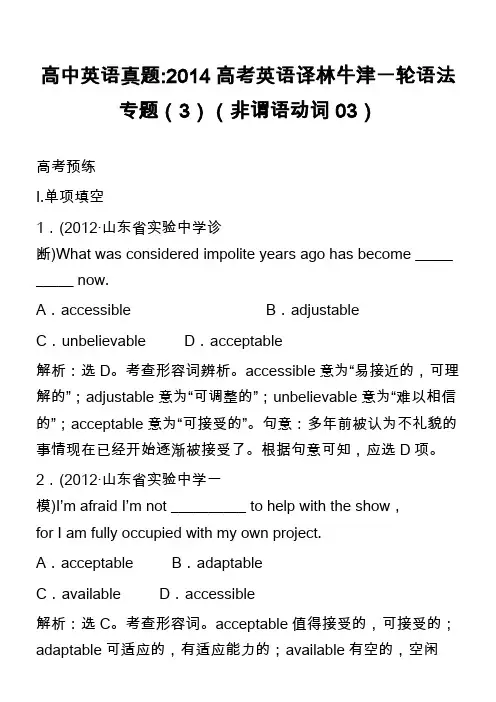
高中英语真题:2014高考英语译林牛津一轮语法专题(3)(非谓语动词03)高考预练Ⅰ.单项填空1.(2012·山东省实验中学诊断)What was considered impolite years ago has become _____ _____ now.A.accessible B.adjustable C.unbelievable D.acceptable解析:选D。
考查形容词辨析。
accessible意为“易接近的,可理解的”;adjustable意为“可调整的”;unbelievable意为“难以相信的”;acceptable意为“可接受的”。
句意:多年前被认为不礼貌的事情现在已经开始逐渐被接受了。
根据句意可知,应选D项。
2.(2012·山东省实验中学一模)I’m afraid I’m not __________ to help with the show,for I am fully occupied with my own project.A.acceptable B.adaptableC.available D.accessible解析:选C。
考查形容词。
acceptable值得接受的,可接受的;adaptable可适应的,有适应能力的;available有空的,空闲的,有时间的;accessible容易取得的,可接近的。
句意:恐怕我不能在这次展览上帮忙了,因为我正忙于自己的项目。
故选C 项。
3.(2012·济南模拟)I keep on walking after supper because I can’t think of a ___ _______ way to keep fit.A.better B.bestC.worse D.worst解析:选A。
考查形容词比较级。
句意:我坚持晚饭后散步,因为我想不到比这更好的保持健康的方法了。
根据语境可知,A项正确。
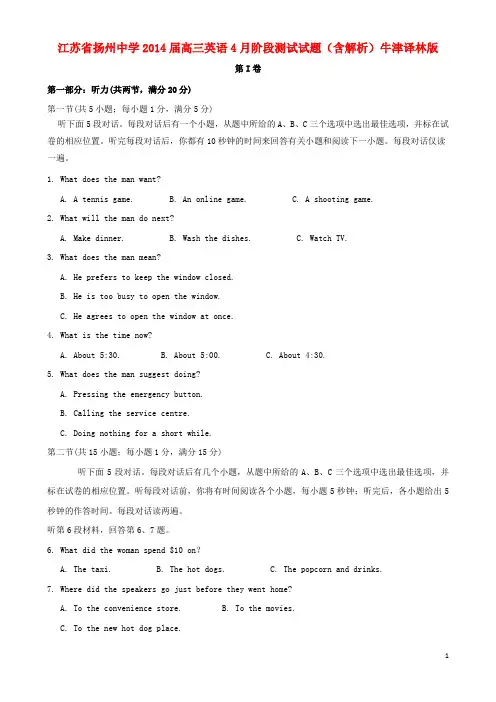
江苏省扬州中学2014届高三英语4月阶段测试试题(含解析)牛津译林版第I卷第一部分:听力(共两节,满分20分)第一节(共5小题;每小题1分,满分5分)听下面5段对话。
每段对话后有一个小题,从题中所给的A、B、C三个选项中选出最佳选项,并标在试卷的相应位置。
听完每段对话后,你都有10秒钟的时间来回答有关小题和阅读下一小题。
每段对话仅读一遍。
1. What does the man want?A. A tennis game.B. An online game.C. A shooting game.2. What will the man do next?A. Make dinner.B. Wash the dishes.C. Watch TV.3. What does the man mean?A. He prefers to keep the window closed.B. He is too busy to open the window.C. He agrees to open the window at once.4. What is the time now?A. About 5:30.B. About 5:00.C. About 4:30.5. What does the man suggest doing?A. Pressing the emergency button.B. Calling the service centre.C. Doing nothing for a short while.第二节(共15小题;每小题1分,满分15分)听下面5段对话。
每段对话后有几个小题,从题中所给的A、B、C三个选项中选出最佳选项,并标在试卷的相应位置。
听每段对话前,你将有时间阅读各个小题,每小题5秒钟;听完后,各小题给出5秒钟的作答时间。
每段对话读两遍。
听第6段材料,回答第6、7题。
6. What did the woman spend $10 on?A. The taxi.B. The hot dogs.C. The popcorn and drinks.7. Where did the speakers go just before they went home?A. To the convenience store.B. To the movies.C. To the new hot dog place.听第7段材料,回答第8至10题。
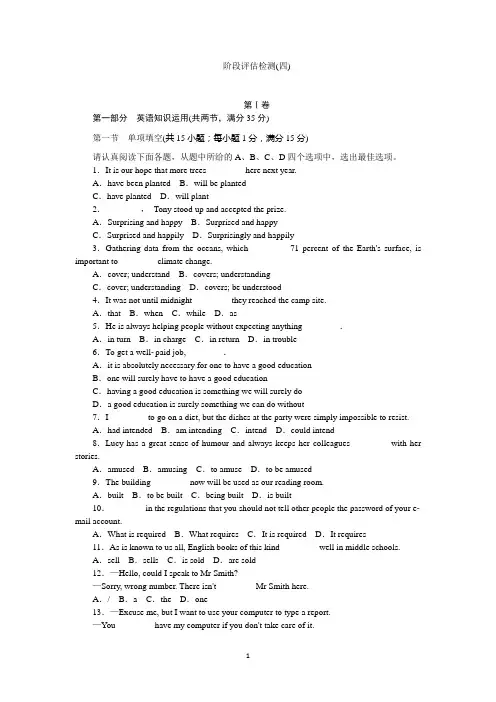
阶段评估检测(四)第Ⅰ卷第一部分英语知识运用(共两节,满分35分)第一节单项填空(共15小题;每小题1分,满分15分)请认真阅读下面各题,从题中所给的A、B、C、D四个选项中,选出最佳选项。
1.It is our hope that more trees ________ here next year.A.have been planted B.will be plantedC.have planted D.will plant2.________,Tony stood up and accepted the prize.A.Surprising and happy B.Surprised and happyC.Surprised and happily D.Surprisingly and happily3.Gathering data from the oceans, which ________ 71 percent of the Earth's surface, is important to ________ climate change.A.cover; understand B.covers; understandingC.cover; understanding D.covers; be understood4.It was not until midnight ________ they reached the camp site.A.that B.when C.while D.as5.He is always helping people without expecting anything ________.A.in turn B.in charge C.in return D.in trouble6.To get a wellpaid job, ________.A.it is absolutely necessary for one to have a good educationB.one will surely have to have a good educationC.having a good education is something we will surely doD.a good education is surely something we can do without7.I ________ to go on a diet, but the dishes at the party were simply impossible to resist.A.had intended B.am intending C.intend D.could intend8.Lucy has a great sense of humour and always keeps her colleagues ________ with her stories.A.amused B.amusing C.to amuse D.to be amused9.The building ________ now will be used as our reading room.A.built B.to be built C.being built D.is built10.________ in the regulations that you should not tell other people the password of your email account.A.What is required B.What requires C.It is required D.It requires11.As is known to us all, English books of this kind ________ well in middle schools.A.sell B.sells C.is sold D.are sold12.—Hello, could I speak to Mr Smith?—Sorry, wrong number. There isn't ________ Mr Smith here.A./ B.a C.the D.one13.—Excuse me, but I want to use your computer to type a report.—You ________ have my computer if you don't take care of it.A.shan't B.needn't C.mustn't D.shouldn't14.The pilot said he could only ________ for another hour before he would have to land the plane because of lack of fuel.A.hold out B.hold down C.hold up D.hold back15.I found a very beautiful coat in a shop this morning, and I'm going to buy ________ this afternoon.A.it B.this C.one D.any第二节完形填空(共20小题;每小题1分,满分20分)请认真阅读下面短文,从短文后各题所给的A、B、C、D四个选项中,选出最佳选项。
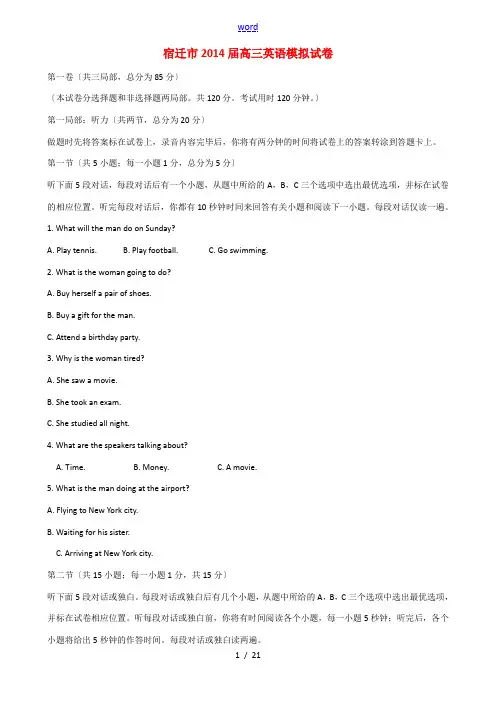
宿迁市2014届高三英语模拟试卷第一卷〔共三局部,总分为85分〕〔本试卷分选择题和非选择题两局部。
共120分。
考试用时120分钟。
〕第一局部:听力〔共两节,总分为20分〕做题时先将答案标在试卷上,录音内容完毕后,你将有两分钟的时间将试卷上的答案转涂到答题卡上。
第一节〔共5小题;每一小题1分,总分为5分〕听下面5段对话,每段对话后有一个小题,从题中所给的A,B,C三个选项中选出最优选项,并标在试卷的相应位置。
听完每段对话后,你都有10秒钟时间来回答有关小题和阅读下一小题。
每段对话仅读一遍。
1. What will the man do on Sunday?A. Play tennis.B. Play football.C. Go swimming.2. What is the woman going to do?A. Buy herself a pair of shoes.B. Buy a gift for the man.C. Attend a birthday party.3. Why is the woman tired?A. She saw a movie.B. She took an exam.C. She studied all night.4. What are the speakers talking about?A. Time.B. Money.C. A movie.5. What is the man doing at the airport?A. Flying to New York city.B. Waiting for his sister.C. Arriving at New York city.第二节〔共15小题;每一小题1分,共15分〕听下面5段对话或独白。
每段对话或独白后有几个小题,从题中所给的A,B,C三个选项中选出最优选项,并标在试卷相应位置。
听每段对话或独白前,你将有时间阅读各个小题,每一小题5秒钟;听完后,各个小题将给出5秒钟的作答时间。
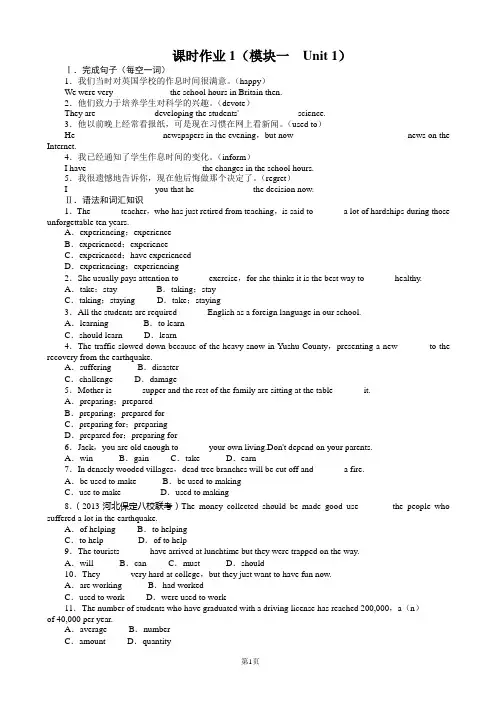
课时作业1(模块一Unit 1)Ⅰ.完成句子(每空一词)1.我们当时对英国学校的作息时间很满意。
(happy)We were very ______ ______the school hours in Britain then.2.他们致力于培养学生对科学的兴趣。
(devote)They are ______ ______ developing the students' ______ ______ science.3.他以前晚上经常看报纸,可是现在习惯在网上看新闻。
(used to)He ______ ______ ______ newspapers in the evening,but now ______ ______ ______ ______news on the Internet.4.我已经通知了学生作息时间的变化。
(inform)I have ______ ______ ______ ______ the changes in the school hours.5.我很遗憾地告诉你,现在他后悔做那个决定了。
(regret)I ______ ______ ______ you that he ______ ______ the decision now.Ⅱ.语法和词汇知识1.The ______ teacher,who has just retired from teaching,is said to ______ a lot of hardships during those unforgettable ten years.A.experiencing;experienceB.experienced;experienceC.experienced;have experiencedD.experiencing;experiencing2.She usually pays attention to ______ exercise,for she thinks it is the best way to ______ healthy.A.take;stay B.taking;stayC.taking;staying D.take;staying3.All the students are required ______ English as a foreign language in our school.A.learning B.to learnC.should learn D.learn4.The traffic slowed down because of the heavy snow in Yushu County,presenting a new ______ to the recovery from the earthquake.A.suffering B.disasterC.challenge D.damage5.Mother is ______ supper and the rest of the family are sitting at the table ______ it.A.preparing;preparedB.preparing;prepared forC.preparing for;preparingD.prepared for;preparing for6.Jack,you are old enough to ______ your own living.Don't depend on your parents.A.win B.gain C.take D.earn7.In densely wooded villages,dead tree branches will be cut off and ______ a fire.A.be used to make B.be used to makingC.use to make D.used to making8.(2013·河北保定八校联考)The money collected should be made good use ______ the people who suffered a lot in the earthquake.A.of helping B.to helpingC.to help D.of to help9.The tourists ______ have arrived at lunchtime but they were trapped on the way.A.will B.can C.must D.should10.They ______ very hard at college,but they just want to have fun now.A.are working B.had workedC.used to work D.were used to work11.The number of students who have graduated with a driving license has reached 200,000,a(n)______ of 40,000 per year.A.average B.numberC.amount D.quantity12.Businessman as he is,his main goal is not only to ______ a profit.A.earn B.challengeC.introduce D.develop13.With so many things ______,we should have a little celebration tonight.A.to achieve B.achievingC.achieved D.having achieved14.—When will we start the restoration of the historic sites?—Not until our plan ______ by the committee.A.will be approved B.approveC.is to approve D.has been approved15.Don't respond to any e-mails ______ personal information,no matter how official they look.A.searching B.askingC.requesting D.questioningⅢ.完形填空(一)When I was a young man,I thought life was all about me —about how I'd make my way in the world,become successful,and get the things I want.__1__then the two of you came into my world with all your curiosity and mischief and those smiles that never__2__to fill my heart and light up my day.And suddenly,all my big plans for myself didn't seem so__3__any more.I soon found that the greatest joy in my life was the joy I saw in yours.And I __4__that my own life wouldn't count for much unless I was able to ensure that you had every opportunity for happiness and fulfillment in yours.In the end,girls,that's why I __5__President:because of what I want for you and for every child in this nation.I want all our children to go to schools worthy of their__6__—schools that challenge them,inspire them,and instill in them a__7__of wonder about the world around them.I want them to have the chance to go to college—__8__their parents aren't rich.And I want them to get good jobs—jobs that pay well and give them benefits like health care,jobs that let them spend time with their own kid and__9__with dignity.Sometimes we have to send our young men and women into war and other dangerous __10__ to protect our country—but when we do,I want to make sure that it is only for a very good reason,that we try our best to settle our differences with others peacefully,and that we do everything possible to keep our servicemen and women__11__.And I want every child to understand that the blessings these brave Americans fight for are not free—that with the great privilege of being a citizen of this nation__12__great responsibility.1.A.So B.While C.But D.Although2.A.fail B.escape C.drop D.prepare3.A.shallow B.important C.respectful D.delighted4.A.recommended B.regretted C.realized D.reminded5.A.searched for B.accounted for C.asked for D.ran for6.A.potential B.ability C.possibility D.reputation7.A.sign B.sense C.ray D.bunch8.A.as if B.now that C.in case D.even if9.A.resign B.resettle C.retire D.request10.A.borders B.situations C.nations D.scenery11.A.satisfied B.fortunate C.successful D.safe12.A.comes B.goes C.lies D.standsⅣ.阅读填空It's easy to see how the sawfish got its name.These frightful creatures can grow to be more than 6 meters long.Their bodies are flat and winged,like underwater airplanes.And their noses are shaped like chainsaws.Sawfish are food hunters of the sea.When a sawfish is hungry,it waves its sharp-toothed snout(口鼻部)through a group of fish.Then,it lifts its nose and uses its mouth to draw the injured victims.Hardy(适应力强的)population of sawfish thrived in warm waters along coastlines around the world for thousands of years.Over the past 200 years,however,human actions have severely endangered sawfish.Threats include fishing nets that trap the huge animals,often by mistake.Some people collect sawfish's snouts as prizes:One snout recently sold for nearly $1600 online.In some Asian cultures,the toothy snouts are used in ceremonies to drive evil and disease away.And sawfish are also delicious.A growing demand in Asia for the fish's fins for a pricey soup has contributed to the fish's pared with other fish,sawfish give birth late in life and at slow rates,which makes it hard for them to recover from overfishing.New efforts now aim to restore sawfish population.Beginning next month,an international agreement willprovide protection for all seven of the world's sawfish species.Scientists are hoping that it's not too late to save the sawfish.Until 1998,“this fish had never been formally studied in the United States,” says Tonya Wiley of the Mote Marine Laboratory in Sarasota,Fla.“We didn't know such basic things as where they live,what habitat they use,how often they breed,how many young they have—even what age sawfish are when they begin breeding.”Through historical studies and field research,scientists have become aware of how much the fish's numbers have decreased.Today,there may be 90 percent fewer sawfish than there used to be.Wiley estimates that only 3000 to 6000 sawfish remain in US waters.SawfishDescriptionsSize 1.______2.______Body:Flat andwingedNose:Like achainsaw3.______ of hunting for food Attacking fish with 4.______Drawing the injured victims with its mouth5.______ Sawfish's disappearance 6.______Sawfish's snout relates businessIts 7.______ and slowly which makes it hard to recover from overfishing8.______ Only 10 % sawfish left3000 to 6000 remain in US watersEfforts9.______ MeasureRestoring sawfish population 10.______ all seven of the world'ssawfish species参考答案Ⅰ.1.happy with2.devoted to;interest in3.used to read;is used to reading4.informed the students about/of5.regret to tell/inform;regrets makingⅡ.1.C第一空为形容词,意思是“有经验的”,修饰teacher;is said to have experienced a lot of...中的to have experienced是不定式的完成体,表示experience(经历)的动作发生在is said之前。
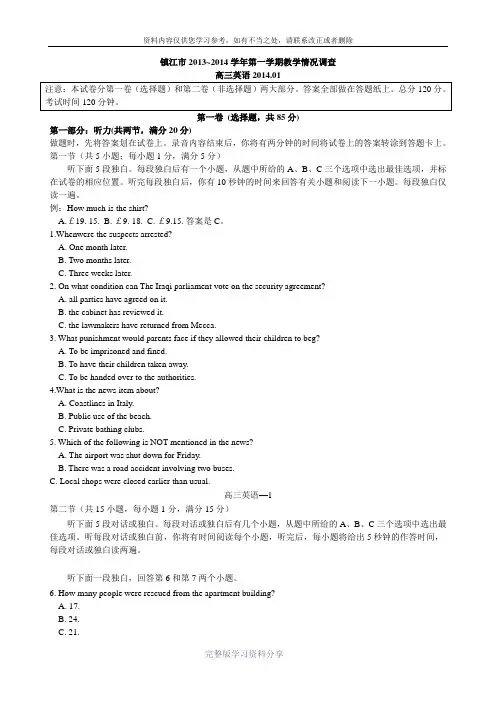
镇江市2013~2014学年第一学期教学情况调查高三英语2014.01第一卷(选择题,共85分)第一部分:听力(共两节,满分20分)做题时,先将答案划在试卷上。
录音内容结束后,你将有两分钟的时间将试卷上的答案转涂到答题卡上。
第一节(共5小题;每小题1分,满分5分)听下面5段独白。
每段独白后有一个小题,从题中所给的A、B、C三个选项中选出最佳选项,并标在试卷的相应位置。
听完每段独白后,你有10秒钟的时间来回答有关小题和阅读下一小题。
每段独白仅读一遍。
例:How much is the shirt?A.£19. 15.B. £9. 18.C. £9.15. 答案是C。
1.Whenwere the suspects arrested?A. One month later.B. Two months later.C. Three weeks later.2. On what condition can The Iraqi parliament vote on the security agreement?A. all parties have agreed on it.B. the cabinet has reviewed it.C. the lawmakers have returned from Mecca.3. What punishment would parents face if they allowed their children to beg?A. To be imprisoned and fined.B. To have their children taken away.C. To be handed over to the authorities.4.What is the news item about?A. Coastlines in Italy.B. Public use of the beach.C. Private bathing clubs.5. Which of the following is NOT mentioned in the news?A. The airport was shut down for Friday.B. There was a road accident involving two buses.C. Local shops were closed earlier than usual.高三英语—1第二节(共15小题,每小题1分,满分15分)听下面5段对话或独白。
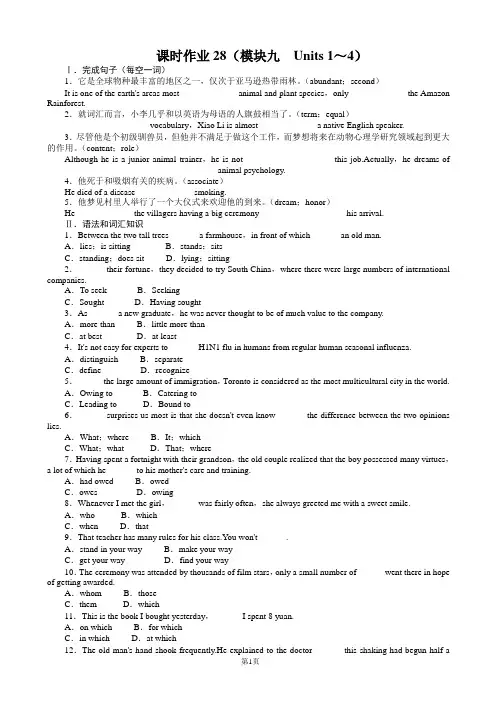
课时作业28(模块九Units 1~4)Ⅰ.完成句子(每空一词)1.它是全球物种最丰富的地区之一,仅次于亚马逊热带雨林。
(abundant;second)It is one of the earth's areas most ______ ______ animal and plant species,only ______ ______ the Amazon Rainforest.2.就词汇而言,小李几乎和以英语为母语的人旗鼓相当了。
(term;equal)______ ______ ______ vocabulary,Xiao Li is almost ______ ______ a native English speaker.3.尽管他是个初级驯兽员,但他并不满足于做这个工作,而梦想将来在动物心理学研究领域起到更大的作用。
(content;role)Although he is a junior animal trainer,he is not ______ ______ ______ this job.Actually,he dreams of ______ ______ ______ ______ ______ ______ animal psychology.4.他死于和吸烟有关的疾病。
(associate)He died of a disease ______ ______ smoking.5.他梦见村里人举行了一个大仪式来欢迎他的到来。
(dream;honor)He ______ ______ the villagers having a big ceremony ______ ______ ______ his arrival.Ⅱ.语法和词汇知识1.Between the two tall trees ______ a farmhouse,in front of which ______ an old man.A.lies;is sitting B.stands;sitsC.standing;does sit D.lying;sitting2.______ their fortune,they decided to try South China,where there were large numbers of international companies.A.To seek B.SeekingC.Sought D.Having sought3.As ______ a new graduate,he was never thought to be of much value to the company.A.more than B.little more thanC.at best D.at least4.It's not easy for experts to ______ H1N1 flu in humans from regular human seasonal influenza.A.distinguish B.separateC.define D.recognize5.______ the large amount of immigration,Toronto is considered as the most multicultural city in the world.A.Owing to B.Catering toC.Leading to D.Bound to6.______ surprises us most is that she doesn't even know ______ the difference between the two opinions lies.A.What;where B.It;whichC.What;what D.That;where7.Having spent a fortnight with their grandson,the old couple realized that the boy possessed many virtues,a lot of which he ______ to his mother's care and training.A.had owed B.owedC.owes D.owing8.Whenever I met the girl,______ was fairly often,she always greeted me with a sweet smile.A.who B.whichC.when D.that9.That teacher has many rules for his class.You won't ______.A.stand in your way B.make your wayC.get your way D.find your way10.The ceremony was attended by thousands of film stars,only a small number of ______went there in hope of getting awarded.A.whom B.thoseC.them D.which11.This is the book I bought yesterday,______ I spent 8 yuan.A.on which B.for whichC.in which D.at which12.The old man's hand shook frequently.He explained to the doctor ______ this shaking had begun half ayear before,and ______,only because of this,he had been forced to give up teaching.A.when;how B.when;whenC.how;how D.why;why13.An idiom ______ that “a picture is worth 1000 words”.A.is B.describesC.speaks D.goes14.Jane's pale face suggested that she______ill,and her parents suggested that she______ a medical examination.A.be;should have B.was;haveC.should be;had D.was;has15.The teacher spoke highly of such ______ as honesty,courage and faithfulness shown by his students.A.deeds B.characteristicsC.skills D.virtuesⅢ.完形填空(一)In history,a real cowboy was a simple farm worker on horseback.He spent a long time a day outdoors working with cows.The work was dirty,tiring and not very well paid.People in the western states had to __1__ cattle at a low cost and send them by railway to the eastern markets.But someone had to __2__ the cattle and get them to the nearest railroad.This was the job of a cowboy.Sometimes the railroad was more than a thousand kilometers away and it could take as long as six months to move the cattle.The __3__ was long but the cattle were driven slowly so as not to lose __4__.Then they could be sold at a good price.Most cowboys were young,unmarried men.A good horse made their job of moving cattle much easier.A good cowboy __5__ cows and knew how to control them.At night,he __6__ to the cows to keep them calm.In the late 1800s,America was changing from a nation of farm to one of __7__ and cities.The cowboys seemed __8__ compared with other Americans doing ordinary jobs.Today,the life of cowboys has changed greatly.One change is the use of trucks.The job is not so hard __9__ it used to be.And cowboys are better __10__ now.They are __11__ to be married.Some of them are farmers or teachers or truck drivers.Some work for big companies.__12__ at night and on weekends,they become cowboys.These part-time cowboys increase the total production of meat,keeping the beef price low.1.A.get B.buy C.sell D.raise2.A.deal with B.find out C.look after D.pay off3.A.journey B.trip C.tour D.travel4.A.mind B.direction C.head D.weight5.A.recognized B.understood C.owned D.kept6.A.whispered B.shouted C.cried D.sang7.A.towns B.countryside C.factories D.offices8.A.free B.brave C.easy D.pleased9.A.that B.as C.which D.what10.A.known B.behaved C.paid D.dressed11.A.afraid B.eager C.worried D.likely12.A.Because B.And C.When D.ButⅣ.完形填空(二)Michelle and I are saddened to learn of the passing of Steve Jobs.Steve was __1__ the greatest of American innovators—brave enough to think __2__,bold enough to believe he could change the world,and talented enough to do it.By building one of the planet's most successful companies from his garage,he exemplified the spirit of American ingenuity(独创性).By making computers personal __3__putting the Internet in our pockets,he made the information revolution not only accessible,but intuitive and fun.And by turning his talents to storytelling,he has brought joy to millions of children and grown-ups __4__.Steve was fond of saying that he lived every day like __5__ were his last.__6__ he did so,he transformed our lives,redefined entire industries,and achieved one of the rarest feats in human history:he changed the way each of us sees the world.The world has lost a visionary.And there may be __7__ greater tribute to Steve's success than the fact that __8__of the world learned of his passing on a device he invented.Ⅴ.阅读简答The Fourth of July marks the anniversary of America's Declaration of Independence from Britain.During thesummer of 1776,American colonists were deeply divided.Almost one in three was loyal to Britain.Yet most were increasingly angry about what they considered unfair treatment by the British government.By June,fighting had already taken place between colonial forces and Britain.The idea of independence was spreading.Delegates from the 13 colonies gathered in Philadelphia,Pennsylvania.The Continental Congress decided that a document declaring separation from Britain should be declared.Thomas Jefferson led a committee chosen to write it.On July fourth,1776,the Continental Congress voted to approve The Declaration of Independence.It says that people have the right to change their government if it denies them their rights.It states that everyone has the right to life,liberty and the pursuit of happiness.Today,the Fourth of July is a time for friends and families to gather.They might play sports and eat hot dogs,hamburgers and other foods cooked outdoors.They might watch a parade in their community.At night,many people gather to watch fireworks bursting in the sky.In Washington,D.C.this year,thousands of people will attend a concert with performances by musicians including Reba McEntire,Darius Rucker and Gladys Knight.There will also be a huge fireworks show with more than 2,500 shells exploding over the National Mall.Another event that traditionally takes place on the National Mall this weekend is the Smithsonian Folklife Festival.This year's event celebrates the cultures of Mexico and Asian Pacific Americans.Visitors can hear the music,eat the food and learn about the many traditions of these cultures.The third subject of the festival is called “Smithsonian Inside Out”.Smithsonian experts will have a chance to present their research and knowledge to the public.1.Why was the idea of independence spreading before July 4,1776?(No more than 10 words.)________________________________________________________________________2.What right does everyone have according to The Declaration of Independence?(No more than 13 words.)________________________________________________________________________3.What does the Fourth of July holiday mean to Americans today?(No more than 10 words.)________________________________________________________________________4.What will happen at “Smithsonian Inside Out” this year?(No more than 12 words.)________________________________________________________________________参考答案Ⅰ.1.abundant in;second to2.In terms of;equal to3.content to do;playing a bigger role in studying 4.associated with5.dreamt of;in honor ofⅡ.1.B本题考查倒装句。
高中英语真题:2014届高考英语模拟试题牛津译林版本试卷分第I卷(选择题)和第II卷(非选择题)两部分, 共120分,考试用时120分钟。
第I卷(三部分, 共85分)注意事项:答第I卷前,考生务必将自己的姓名、考试号、考试科目涂写在答题卡上。
考试结束,将试题卷和答题卡一并交回。
每小题选出答案后,用铅笔把答题卡上对应题目的答案标号涂黑,如需改动,用橡皮擦干净后,再选涂其他答案标号,不能答在试题卷上。
考试结束,考生将本试卷和答题卡一并交回。
否则不予计分。
第一部分:听力(共两节,满分20分)做题时,先将答案标在试卷上。
录音内容结束后,你将有两分钟的时间将试卷上答案转涂到答题卡上。
第一节(共5小题;每小题1分,满分5分)听下面5段对话。
每段对话后有一个小题,从题中所给的听完每段对话后,你都有10秒钟的时间来回答有关小题和阅读下一小题。
每段对话仅读一遍。
例:How much is the shirt?A. £19.15B. £9.18C. £9.15答案是C1. What time is it now?A. 6:10.B. 6:00.C. 5:50.2. How long has the man tried to study Spanish?A. More than a year.B.Three months.C. H alf a year.3. Where does the woman want to go?A. A library.B. The .C. A drugstore.4. Why did the man go to ?A. To look after his parents.B. To visit his sister.C. T o handle an accident.5. What are the speakers going to do in the evening?A. Go to the bank.B. Have a dinner.C. Get so me money.第二节(共15小题;每小题1分,满分15分)听下面5段对话或独白。
课时作业3(模块一Unit 3)Ⅰ.完成句子(每空一词)1.露西很为自己的体重感到羞愧,她决心每周在健身房锻炼五次。
(ashamed;work)______ ______ her weight,Lucy determines to ______ ______ in the gym five times a week.2.因为对自己的考试成绩感到很尴尬,这个男生非常想获得一些提高英语成绩的建议。
(embarrass;die)______ ______ his performance in the exam,the boy is ______ ______ some advice about how to improve his English.3.你认为生活更忙碌点能帮我增重吗?我要更重一点以让自己感觉更良好一点。
(put;feel)Do you think a busier life will help me ______ ______ ______?I need a greater weight to ______ ______ ______ ______.4.获悉有些高中生正一门心思钻研大学功课,我很吃惊。
(concentrate/focus)I am ______ ______ ______ that some senior high school students are ______ ______ university lessons.5.从长远来说,为追求苗条的身材而不吃早餐不会让你身体健康。
(term;shape)______ ______ ______ ______,skipping meals for a ______ ______ won't help you ______ ______ ______.Ⅱ.语法和词汇知识1.Jacob placed his arms around her ______ shoulders.A.slim B.slenderC.skinny D.bright2.In such a close game,every point ______.A.does B.worksC.pays D.counts3.Don't be ______ by any text message saying that you have won a shocking prize.A.taken in B.taken offC.taken out D.taken up4.We are still ______ the plan,but we don't know how it will ______.A.working on;work out B.working out;work onC.figuring out;turn up D.making out;show up5.—Oh,poor Peter looks very weak.—______ if you suffer from high fever for three days on end.A.So are you B.So you areC.So will you D.So you will6.These trees must have been planted three years ago,______?A.weren't they B.mustn't theyC.didn't they D.haven't they7.An explosion blew the roof off an unstable reactor north of Tokyo,______ fears of a disaster at a nuclear plant ______ in the massive earthquake that hit Japan.A.raising;damaged B.raised;being damagedC.to raise;to be damaged D.raising;damaging8.No matter how much money you have,it cannot ______ good health.A.match B.fitC.defeat D.compare9.Have you ever heard ______ a man nicknamed Throat Cutter?He is wanted by Interpol.A.from B.of C.for D.at10.Wind power is an ancient source of energy ______ we may return in the near future.A.on which B.by whichC.to which D.from which11.My cousin would like to risk ______ the weight-loss pills rather than working out in a gym.A.to take B.to be takingC.taking D.taken12.Is this TV set ______ you wish to have ______?A.the one;repaired B.which;it repairedC.the one;it repaired D.which;repaired13.He was worried,because he lost his bag ______ his passport,ID card and a lot of money.A.included B.includingC.contained D.containing14.Teenagers ______ their health because they play computer games too much.A.have damaged B.are damagingC.damaged D.will damage15.The way you ______ means a lot when you work as a model.A.wear B.dressC.are dressed D.are wornⅢ.阅读理解An old English saying says,“Laughter is the best medicine.” One person who certainly would have agreed this is Norman Cousins.Norman Cousins was a writer of a magazine called Saturday Re v ie w for almost forty years.He also wrote and spoke about world peace,traveling to many different countries to share his ideas.In the 1960s,after returning to the United States from a busy and tiring trip to Europe,Mr Cousins got sick.He found he had a rare disease,known as ankylosing spondylitis.In less than a week after he got back,he could not stand.Every move that he made was painful.He was not able to sleep at night.The doctors told Mr Cousins that they did not know how to cure his disease and he might never get over the illness.Mr Cousins,however,refused to give up hope.Mr Cousins thought that the illness could be caused by unhappy thoughts.He did not want to take medicine to cure himself.Instead,he felt that happy thoughts or laughter might cure his illness.He began to experiment on himself while still in the hospital by watching comedy shows on television.Mr Cousins quickly found that ten minutes of real laughter during the day gave him two hours of pain-free sleep at night.Deciding that the doctors could not help him,Mr Cousins left the hospital and checked into a hotel room where he could continue his experiments with laughter.For eight days,Mr Cousins rested in the hotel room watching comedy shows on television,reading funny books,and sleeping whenever he felt tired.Within three weeks,he felt well enough to take a vacation to Puerto Rico where he began running on the beach for exercise.After a few months,Mr Cousins was able to carry on his pens.He had laughed himself back to health.1.Norman Cousins wrote about ______ for a magazine.A.illness cure B.world peaceC.comedy shows D.traveling stories2.What is NOT TRUE about Norman Cousins' disease?A.It is uncommon.B.It makes walking difficult.C.It is easily cured.D.It is painful.3.Mr Cousins thought that it was ______ that cured him.A.taking a vacation B.running on the beachC.medicine D.laughter4.What can we infer from the last paragraph?A.Mr Cousins continued his job.B.Mr Cousins went back to the hospital.C.Mr Cousins wrote funny books.D.Mr Cousins gave up his work.5.What is the passage mainly about?A.Ankylosing spondylitis,a rare diseaseB.Norman Cousins's struggle with a diseaseC.Laughter,the best medicine for diseasesD.Comedies and funny booksⅣ.阅读简答Not long ago,people thought babies were notable to learn things until they were five or six months old.Yet doctors in the United States say babies begin learning on their first day of life.Scientists note that babies are strongly influenced by their environment.They say a baby will smile if her mother does something the baby likes.A baby learns to get the best care possible by smiling to please her mother or other caregivers.This is how babies learn to connect and communicate with other human beings.One study shows that babies can learn before they are born.The researchers placed a tape recorder on the stomach of a pregnant woman.Then,they played a recording of a short story.On the day the baby was born,the researchers attempted to find if he knew the sounds of the story repeated while in his mother.They did this by placing a device in the mouth of the newborn baby.The baby would hear the story if he moved his mouth one way.If the baby moved his mouth the other way,he would hear a different story.The researchers said the baby clearly liked the story he heard before he was born.They said the baby would move his mouth so he could hear the story again and again.Another study shows how mothers can strongly influence social development and language skills in their children.Researchers studied the children from the age of one month to three years.The researchers attempted to measure the sensitivity of the mothers.The women were considered sensitive if they supported their children's activities and did not interfere unnecessarily.They tested the children for thinking and language development when they were three years old.Also,the researchers observed the women for signs of depression.The children of depressed women did not do as well in tests as the children of women who did not suffer from depression.The children of depressed women did poorly in tests of language skills and understanding what they heard.These children also were less cooperative and had more problems dealing with other people.The researchers noted that the sensitivity of the mothers was important to the intelligence development of their children.Children did better when their mothers were caring,even when they suffered from depression.1.What does the experiment in which newborn babies heard the stories prove?(No more than 5 words.)________________________________________________________________________2.In the passage,what factors are mentioned that influence intelligence development in babies?(No more than 8 words.)________________________________________________________________________3.Which group of children did the worst in tests of language skills?(No more than 11 words.)________________________________________________________________________4.What is the main idea of the passage?(No more than 8 words.)________________________________________________________________________参考答案Ⅰ.1.Ashamed of;work out2.Embarrassed about;dying for3.put on weight;feel better about myself 4.surprised to know/learn;concentrating/focusing on5.In the long term;slim figure;get into shape Ⅱ.1.C考查形容词词义辨析。
苏州中学2013-2014学年度第一学期采点考试 本试卷分第i 卷(选择题)和第分钟。
第I 卷将正确的选项填涂在答题卡的相应位置上,第佳答案。
你将有5秒钟阅读各小题,另有 5秒钟答题。
每段对话或独白读两遍。
听第6段材料,回答第6至7题6. How much does a sin gle room cost duri ng peak seas on?A. $ 50.B. $ 100.7. What time does lunch end?A. At 12:00 a. m.B. At 2:00 p. m. 听第7段材料,回答第8至第9题8. What's the girl's good n ews?A. She won a scholarship.B. Her story was accepted by a magaz ine.C. She'll have a two-week holiday.9. What's the relatio nship betwee n the speakers?A. Classmates.B. Teacher and stude nt.听第8段材料,回答第10至第12题第I 卷(选择题,共 85分) 一.听力部分(20分) 第一节 听下面5段对话。
每段对话后有一个小题。
从题中所给的 听完每段对话后,你都有 1. Who is the man? A. A musicia n. B. An engin eer.2. What does the man really want? A. A si ngle room. B. A twin-bedded room.3. What is NOT men ti oned as a differe nee? A. Body temperature. B. Weight.4. What was the woma n probably doing? A. Exereis ing. B. Shopp ing.5. What do we know about the man? A. He wants to know if the woma n has a watch. B. He is un happy with the woma n. C. He was late this morni ng. 第二节 听下面5段对话或独白。
阶段评估检测(三)必修3(120分钟 120分)第一部分听力(共两节,满分20分)第一节(共5小题;每小题1分,满分5分)听下面5段对话。
每段对话后有一个小题,从题中所给的A、B、C三个选项中选出最佳选项,并标在试卷的相应位置。
听完每段对话后,你都有10秒钟的时间来回答有关小题和阅读下一小题。
每段对话仅读一遍。
1. Where does this conversation most probably take place?A. In a department store.B. In a grocery store.C. At the tailor’s.2. When can the man get the computer?A. On Tuesday.B. On Wednesday.C. On Thursday.3. How did the woman come to the city?A. On foot.B. By bus.C. Driving.4. What are the speakers talking about?A. Some singers.B. A live concert.C. A record.5. What is the man?A. A salesman.B. A policeman.C. A student.第二节(共15小题;每小题1分,满分15分)听下面5段对话或独白。
每段对话或独白后有几个小题,从题中所给的A、B、C三个选项中选出最佳选项,并标在试卷的相应位置。
听每段对话或独白前,你将有时间阅读各个小题,每小题5秒钟;听完后,各小题给出5秒钟的作答时间。
每段对话或独白读两遍。
听第6段材料,回答第6、7题。
6. When will the plane take off?A. At 9: 00.B. At 9: 15.C. At 9: 30.7. What will the man do after the conversation?A. Fasten his seat belt.B. Take his seat.C. Find a proper seat.听第7段材料,回答第8至10题。
苏州市2014届高三调研测试英语2014.1第一部分:听力(共两节,满分20分)做题时,先将答案标在试卷上。
录音内容结束后,你将有两分钟时间将试卷上的答案转涂到答题卡上。
第一节(共5小题;每小题1分,满分5分)听下面5段对话。
每段对话后有一个小题,从题中所给的A、B、C三个选项中选出最佳选项,并标在试卷的相应位置。
听完每段对话后,你都有10秒钟的时间来回答有关小题和阅读下一小题。
每段对话仅读一遍。
1.Where are the two people during the conversation?A. In a bus.B. In a plane.C. In a train.2. What does the woman say about the hat?A. The hat is quite fashionable.B. People may use it day and night.C. The hat can be worn in different weather.3. What are the two people discussing?A. Setting the table.B. Cleaning the kitchen.C. Decorating a shop window.4. What is the most probable job of the woman?A. A professor.B. A saleswoman.C. An apartment manager.5. Why can't the woman have lunch with the man?A. Because she doesn't want to.B. Because she will be terribly busy.C. Because she will have lunch with somebody else第二节(共15小题;每小题1分,满分15分)听下面5段对话或独白。
扬州市2013-2014学年度高三期末质量检测英语试卷本试卷分五部分。
满分120分。
考试时间120分钟。
第Ⅰ卷(共85 分)第一部分:听力(共两节,满分20分)做题时,先将答案标在试卷上。
录音内容结束后,你将有两分钟的时间将试卷上的答案转涂到答题卡上。
第一节(共5小题;每小题1分,满分5分)听下面5段对话。
每段对话后有一个小题,从题中所给的A、B、C三个选项中选出最佳选项,并标在试卷的相应位置。
听完每段对话后,你都有10秒钟的时间来回答有关小题和阅读下一小题。
每段对话仅读一遍。
1. What do we learn from the conversation?A. The man hates to lend his tools to other people.B. The man hasn‟t finished working on the bookshelf.C. The man lost those tools.2. What are the two speakers talking about?A. A park.B. A trip.C. A cinema.3. What does the man mean?A. He would like to make an appointment for the woman.B. He thinks it worthwhile to try Santerbale‟s.C. He knows a less expensive place for a haircut.4. What do we learn from this conversation?A The man wants to go to Los AngelesB The man wants to go to San Francisco.C There are no flights to Los Angeles for the rest of the day.5. What is the woman‟s opinion of the research paper?A. It‟s fine as it is.B. Only a few changes should be made in it.C. Major revisions are needed in it.第二节(共15小题;每小题1分,满分15分)听下面5段对话或独白。
阶段评估检测(三)第Ⅰ卷第一部分英语知识运用(共两节,满分35分)第一节单项填空(共15小题;每小题1分,满分15分)请认真阅读下面各题,从题中所给的A、B、C、D四个选项中,选出最佳选项。
1.If ________ in, the viruses can cause illness and people to die.A.breathing B.breathed C.are breathed D.they breathed2.My boss made ________ clear that one in three of us will have to leave next month.A.it B.us C.that D.this3.Going on a trip into ________ space must be quite ________ exciting experience.A./; the B./; an C.the; an D.the; a4.According to a research, it is better to express your anger, ________ bottle it up.A.more than B.less than C.other than D.rather than5.The children look light-hearted ________ the final exam is over.A.now that B.as far as C.up till D.even though6.Nowhere else ________ find the missing wallet just now.A.we could B.we can C.could we D.can we7.There are also strange records, like the Englishman who ________ a small car ________ 159.6 kilogrammes ________ for thirtythree seconds!A.has balanced; weighed; on the head B.balanced; weighed; by the headC.balanced; weighing; on his head D.had balanced; weighing; by his head8.When he came back to life, he found himself ________ in the woods and everything he had ________.A.lay; stolen B.lying; had stolenC.lying; stolen D.lay; had been stolen9.—________ you interrupt now? Can't you see I'm on the phone?—Sorry sir, but it's urgent.A.Can B.Should C.Would D.Must10.The villagers built another bridge, which is ________ the old one.A.three times as width as B.the width three times asC.three times wider as D.three times the width of11.The village seemed deserted, the only sign of life ________ some trees waving in the howling wind.A.were B.being C.was D.to be12.It is required that the school ________ the students lessons during the holidays.A.not give B.doesn't give C.not be given D.didn't give13.Why not try your luck downtown, Bob? That's ________ the best jobs are.A.where B.what C.when D.why14.________ came that Prime Minister David Cameron blamed the worst riots in Britain the other day.A.Words B.A word C.The word D.Word15.I tried all I could ________ the topic at the meeting, but failed.A.to avoid to mentioning B.to avoid mentioningC.avoid to mentioning D.avoid mentioning第二节完形填空(共20小题;每小题1分,满分20分)请认真阅读下面短文,从短文后各题所给的A、B、C、D四个选项中,选出最佳选项。
A young man waited at a stop light. In front of him was a woman going through papers on the seat of her car and when the light changed to green, she didn't go. A green light is not a __16__,you know. It is more of a demand. But she didn't __17__.When the light turned red again, she still had not __18__ her car. The man now started __19__ and beating his steering wheel.A __20__ tapped on his windshield (挡风玻璃). He asked for his __21__,returned to his car, talked on the radio, and finally handed it back. The driver protested, “I knew you couldn't __22__ me for shouting in my own car!”The officer replied, “I didn't want to __23__ you of that. But I was directly behind you. I __24__ you screaming, and I said to myself, ‘That man is out of __25__. He's going to __26__ someone!’”“Then I noticed the cross __27__ from your rear view mirror, the bright yellow ‘Love Is a Choice’ license tag, and the ‘Give __28__ a Chance’bumper sticker (保险杠标签), and I am sure you must have stolen the __29__.”His behavior did not __30__ his bumper sticker. But let's not be too __31__. Are we always the people we want to be? We make __32__ all the life. Personal change can happen when the person we at present are does not yet __33__ the person we hope to be. Better to set high ideals and __34__ fall short than to settle for mediocrity (平庸).The important question is not, “Who are you today?” It is __35__ to ask, “Who will you be tomorrow?”16.A.mark B.suggestion C.warning D.symbol17.A.observe B.follow C.require D.notice18.A.moved B.reached C.repaired D.left19.A.crying B.confusing C.screaming D.complaining20.A.businessman B.psychologist C.manager D.policeman21.A.passport B.license C.address D.name22.A.arrest B.suspect C.charge D.criticize23.A.remind B.accuse C.inform D.appeal24.A.felt B.reported C.saw D.recorded25.A.control B.patience C.anger D.despair26.A.hate B.terrify C.kill D.hurt27.A.sticking B.hanging C.lying D.tying28.A.Peace B.Desire C.Anxiety D.Courage29.A.car B.sticker C.cross D.tag30.municate B.represent C.reflect D.express31.A.horrible B.critical C.curious D.serious32.A.decisions B.mistakes C.promises D.changes33.A.resemble B.admire C.respect D.differ34.A.endlessly B.never C.sometimes D.seldom35.A.worse B.more usefulC.more interesting D.better第二部分阅读理解(共15小题;每小题2分,满分30分)请认真阅读下列短文,从短文后各题所给的A、B、C、D四个选项中,选出最佳选项。